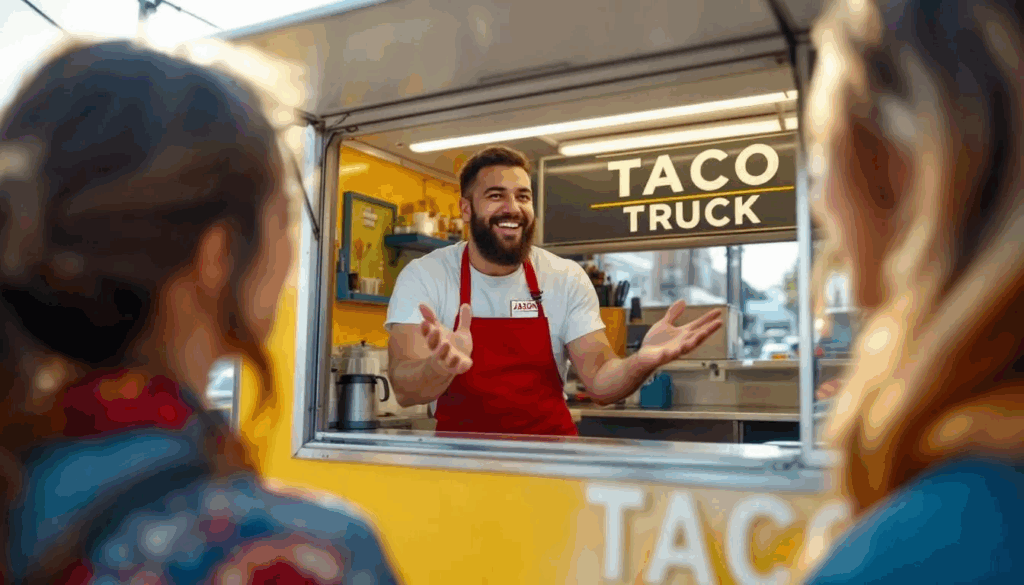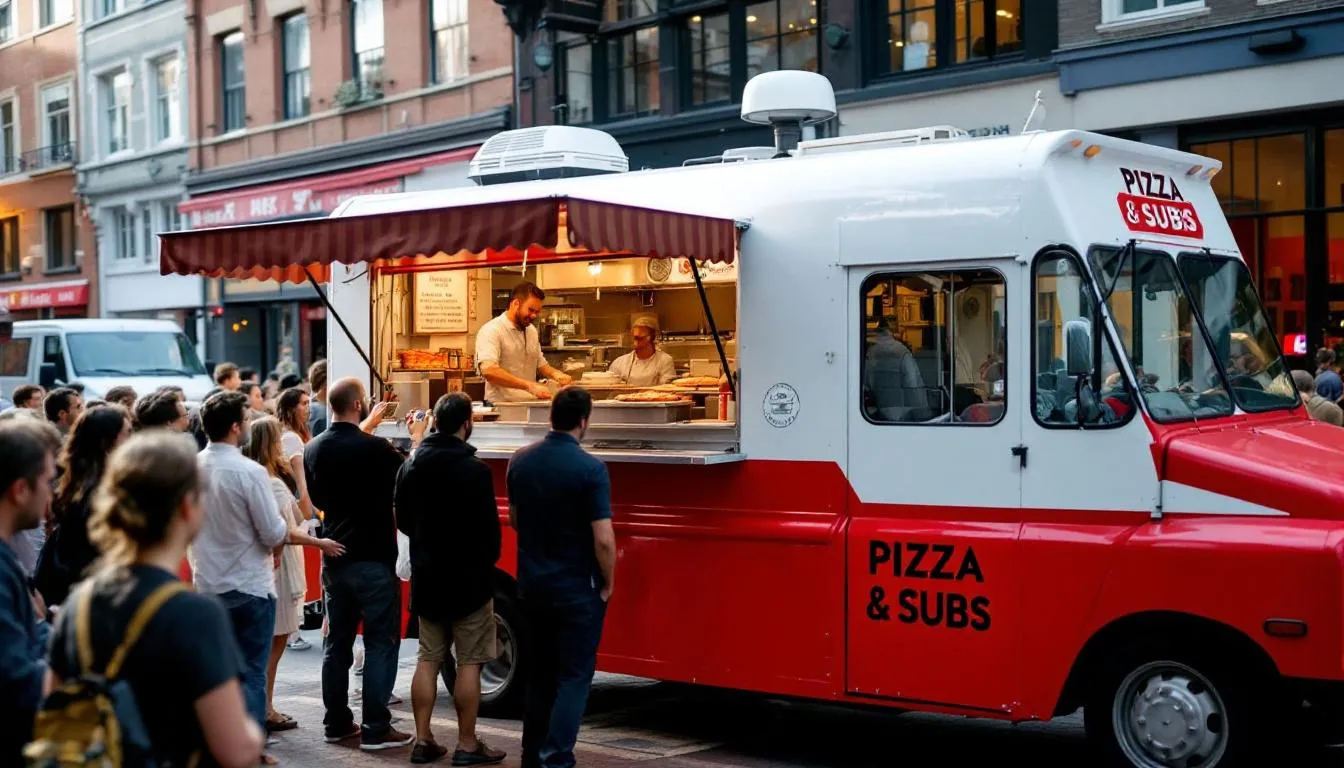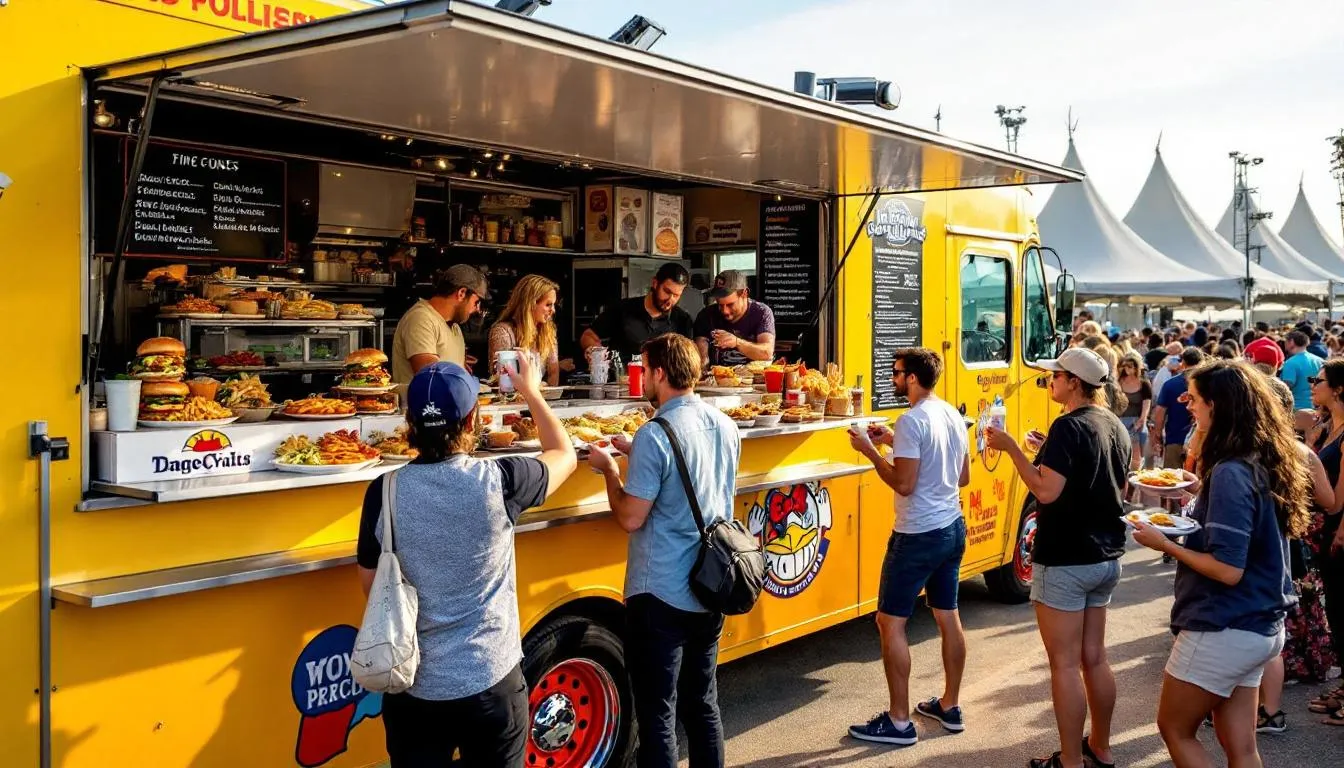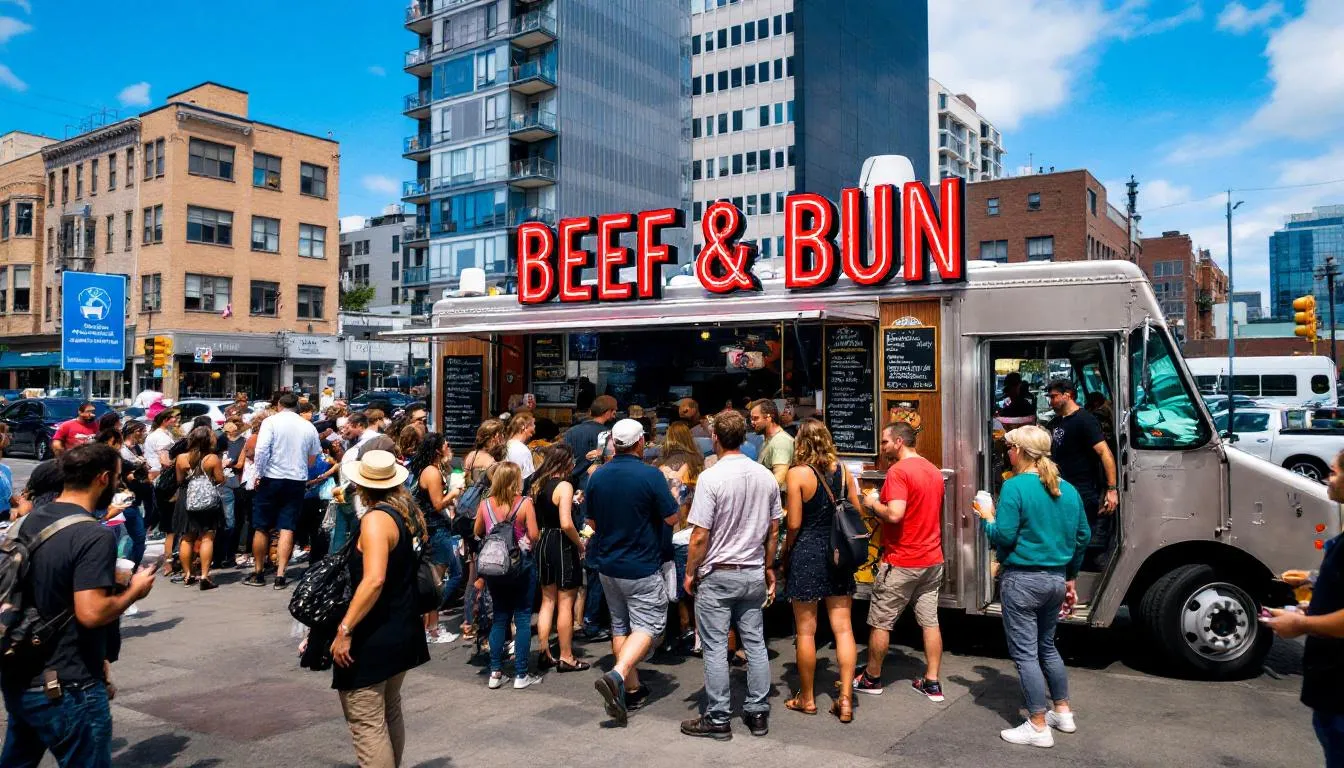What is a Food Truck Business?
Food trucks have been around for a long time, but have recently received a surge in popularity. A successful food truck business can be highly profitable, but it requires careful consideration and planning. Similarly, a food trailer business can also provide business success. Understanding local regulations and obtaining the necessary permits is crucial for starting a food truck business.
Creating a comprehensive business plan is essential for a food truck venture. A business plan should outline the food truck concept, including its unique aspects, as well as the menu and service offerings. Defining the target market is vital when developing a business plan for a food truck.
Researching market costs is the first step to starting a successful food truck business. A marketing strategy should be included in the business plan to attract and retain customers. Financial projections in a business plan must cover startup costs, operating expenses, and revenue forecasts. A detailed budget should outline initial and ongoing expenses for operating a food truck.
Lenders want strong business plans due to the high failure rate of food trucks. Your business plan should justify seeking financing by explaining how the funds will be used. Submitting a loan application requires a thorough review of all conditions, including interest rates and the repayment schedule. Having a personal financial runway is key to a successful startup.
What is Food Truck Financing?
Food truck financing, or food trailer financing, refers to any loan or lease to support your food truck business. There are various financing options available for food trucks. Most options have flexible terms. Some food truck loans require a down payment of up to 20%. Food truck loans can be more accessible than traditional restaurant loans due to lower startup costs.
Let’s look at some food truck financing solutions to grow your food truck business.
Equipment Loans
The equipment loan is one of the most valuable forms of financing for food truck owners. Equipment loans often come with lower interest rates compared to unsecured business loans. You can use an equipment loan to acquire ovens, deep fryers, or even additional food trucks.
The asset(s) you’re financing with an equipment loan are the collateral. A loan with built-in collateral is known as a self-collateralized or secured loan. Loans without collateral are unsecured loans.
Lenders face less risk with equipment loans because the equipment serves as collateral. The lower risk leads to more significant borrowing amounts with lower interest rates and longer repayment terms. You’ll build equity in the equipment as you repay the loan.
Equipment loans are very popular with food truck owners because you can finance most or all of the most expensive aspects of your business. In addition to financing trucks and cooking equipment, you can also finance point-of-sale card readers and truck décor.
Equipment loan features:
-
Up to $5 million per piece of equipment.
-
Interest rates start at 3.5%.
-
Loan terms are between 1 and 6 years.
-
The loan is funded in 3-10 business days.
Equipment Leasing
Another food truck financing option is to lease your equipment. Lease payments are typically lower than loan payments, although you can end up paying more over time.
With a lease, you won’t own the equipment. This can be particularly helpful when the truck or kitchen equipment is likely to lose value or become obsolete. However, some leases come with usage limits.
Leasing is a viable option for new businesses or those with limited credit history. Most business loans require at least a year in business and have high credit score requirements. If you’re just starting, leasing might be the way to go until you build enough business credit history to pursue a loan option.
Other Food Truck Financing Options
In addition to equipment financing, several small business loans could help you grow your food truck business. Unlike an equipment loan, other small business loans put the funds in your account.
Let’s review some loan options for your food truck business.
Small Business Administration (SBA) Loans
SBA loans are sometimes considered the gold standard of small business loans. The Small Business Administration partially backs SBA loans (up to 85%). Since the government supports the loans, financial institutions can lend large amounts of money at low interest rates. If approved, you could use an SBA loan to fund any aspect of your food truck business.
The drawback to the SBA loan program is that it can be challenging to qualify. You’ll typically need excellent credit, substantial revenue, and an established business history. Microloans can offer financing ranging from $500 to $50,000 for food truck businesses.
Business Lines of Credit
One of the lesser-known but highly valuable small business financing options is the business line of credit. Business lines of credit provide a revolving line of credit that can be used repeatedly. You have a standing available credit limit that you can use – or not use – to cover business expenses. When you draw funds from your line of credit, you pay off the balance and interest in weekly payments.
A business line of credit helps food truck businesses cover cash flow shortages and emergencies. For example, let’s say there’s a sudden rush on one of your less popular menu items, and you need an urgent resupply from your food vendor. A business line of credit can help you cover unexpected expenses.
Merchant Cash Advance
A merchant cash advance can give your food truck a cash infusion when you need it. You repay the loan with future credit and debit card sales; the amount you can borrow depends on your credit card sales volume.
Seasonality and industry trends cause many food truck businesses to experience fluctuations throughout the year. A merchant cash advance helps cover costs when your cash flow can’t support traditional fixed loan payments.
Working Capital Loan
A working capital loan is short-term financing to help you cover expenses. You can use a working capital loan to pay for business operations before your busy season starts. It can also help you solve cash flow issues during the slow season. These are typically smaller loans with a flexible payment plan.
For example, let’s say winter is winding down, and you expect a massive influx of foot traffic at your food truck location(s). You could use a working capital loan to stock up on food and supplies to prepare, and then repay the loan when your cash flow picks up.
Revenue-Based Business Loan
Revenue based financing provides food truck owners with more flexible payment terms. It’s similar to a merchant cash advance, except that instead of being based on credit and debit card sales, it’s based on total revenue. Food truck businesses often make a lot of cash sales in addition to debit and credit cards.
Your monthly revenue determines your loan amount. However, you can pay the loan on a daily, weekly, or monthly basis. Payments fluctuate with sales volume.
Business Term Loans
When most people talk about business loans, they’re referring to term loans. A business term loan is a traditional loan where you receive a large sum upfront and repay it plus interest in fixed monthly payments over a predetermined loan term.
You can use a business term loan to finance most aspects of your food truck business, including the truck itself. However, business term loans are unsecured financing, meaning there is no built-in collateral. As such, credit approval may require a personal guarantee or the offering of business assets as collateral.
How do Food Truck Equipment Loans work?
Imagine you want to upgrade your food truck’s industrial oven. Or perhaps you want to expand your fleet with the purchase of a new food truck. The food truck financing process enables you to acquire the necessary truck or equipment at lower upfront costs.
You find an equipment vendor with the pieces you need. The price is right, and you’re ready to finance your equipment purchase. The next step is getting the equipment invoice.
Now, you select your lender or lending marketplaces. When looking for a lender, you want low interest rates, fast funding, and a reputable financing partner.
Each lending institution has a different application process, but all require the equipment invoice. You apply and get approved. Lenders typically consider a credit score, annual revenue, the business’s operating history, and financial projections when evaluating loan eligibility.
Next, the lender sends the funds for the invoice to the equipment vendor. In some cases, you can finance 100% of the cost. Some food truck loans require a down payment of up to 20%.
You receive your new equipment, and the lender is added to the title with you. You repay the loan and interest in fixed monthly payments for the loan term. After the final payment is made, the lender releases the title to your equipment, and you own it outright.
Let’s review your food truck funding options.
Traditional Lenders
Many commercial banks and traditional lenders offer financing for food trucks. If you already have a business bank account with a commercial bank, this could be an excellent starting point. Commercial banks provide some of the lowest interest rates on the market. Most lenders look for good credit. Traditional lenders typically require additional paperwork, such as tax documents.
There are two main drawbacks to traditional banks, though. The first is strict qualification requirements. Most banks require an excellent personal credit score, substantial revenue, and several years of business experience.
The second drawback is funding time. Funding your food truck loan with a traditional bank could take several weeks.
Alternative Lenders & Lending Marketplaces
Online lenders and lending marketplaces offer more agile funding options than traditional banks. Many food truck businesses, like online lending alternatives, prefer them due to their lower qualification requirements and faster funding times.
A word of caution, though: not all online lending options are the same. Many are legit, reputable businesses, but some are just trying to make a quick buck. When evaluating a lending platform, look for positive customer reviews and an excellent online reputation.
As a food truck owner, you want to trust your lending partner. It’s reassuring to know that other small businesses trust them as well.
Food Truck Manufacturers
Some food truck manufacturing companies also provide in-house financing. They typically offer more industry expertise, but may have higher requirements for creditworthiness.
What are the qualifications for Food Truck Business owners?
The specific qualifications vary depending on the type of loan and the institution. Food truck loans are available to business owners across the credit spectrum.
Most traditional banks require a minimum credit score of 680 for food truck loans, which can vary depending on down payments and annual revenue.
To qualify for an equipment loan with United Capital Source, you will need the following:
-
A minimum credit score of 600.
-
At least 1 year in business.
-
Annual revenue of $250,000+.
How to Apply for a Food Truck Equipment Loan:
Follow these steps to apply with United Capital Source.
Step 1: Make sure buying equipment is right for your business.
You want to make sure the equipment is worth the cost of the loan. You will pay interest on the loan, so you must ensure the business impact justifies the interest costs.
Step 2: Gather your documentation.
You need to provide the following:
-
Driver’s license.
-
The invoice for the food truck equipment.
-
Voided check from your business checking account.
-
Bank statements from the past three months to demonstrate cash flow.
-
Financial statements.
-
SBA loans may require additional documents, such as business tax returns.
Step 3: Complete the application.
The application process is relatively fast, and you can apply directly through our one-page application in a matter of minutes or reach out to one of our loan experts to guide you through the process.
Step 4: Speak to a representative.
After we receive your application, a senior account executive will contact you. The account executive will discuss your needs and focus on providing you with food truck loan offers. We offer complete transparency, with no hidden fees or surprises.
You’ll get a complete breakdown of loan amounts, terms, and fees. Once you have all the information, you can decide which options make the most sense for your business.
Step 5: Get approved.
Your loan is approved when your application meets the underwriting requirements and receives credit approval. Next, the funds are transferred directly to the seller to cover the invoice. We can help you set up automatic payments, or you can arrange to pay by check or electronic payment.
What are the benefits of Food Truck Financing?
Food truck financing offers several advantages. It is a strategic and cost-effective solution for aspiring or growing mobile food vendors to access the capital they need without depleting their cash reserves. It allows entrepreneurs to purchase or upgrade their truck, kitchen equipment, signage, and technology without waiting to save up the full amount.
Many food truck financing options offer flexible repayment terms, competitive interest rates, and fast funding, especially when backed by the equipment being financed. Financing can also help build business credit over time, provided payments are made consistently, thereby strengthening the business’s ability to qualify for larger funding in the future. Whether you’re launching a new concept or expanding your fleet, financing can support growth while preserving working capital for daily operations and marketing.
What are the drawbacks of Food Truck Financing?
While food truck financing can be a powerful tool, it also comes with specific challenges. Monthly loan payments are added to your regular business expenses, which can be challenging during slower seasons or when sales fluctuate.
Some financing options may require a personal guarantee or collateral, which can put your assets at risk in case of default. Depending on your credit profile and the length of your business, you may face higher interest rates or less favorable terms.
Additionally, equipment loans and leases may include prepayment penalties or restrictions on upgrades, making it more difficult to pivot quickly if your business needs change.
Food Truck Financing Pros & Cons
Pros:
-
Fast access to funding for equipment, trucks, or upgrades
-
Helps build business credit with timely repayment
-
Preserves working capital for operating expenses
-
Flexible loan and lease options available
Cons:
-
Monthly payments can strain cash flow
-
May require collateral or a personal guarantee
-
High rates are possible for newer businesses or those with bad credit
-
Prepayment penalties or restrictions may apply
Food Truck Loan FAQ
Here are some of the most common questions about food truck loans.
Can I get Food Truck Loans with bad credit?
Most food truck loans require good to excellent credit. Fortunately, equipment financing is easier to obtain. Since the equipment serves as collateral, lenders are more open to working with business owners who have bad credit. Microloans are available to borrowers across the credit spectrum.
You may find business loan options with bad credit that come with higher interest rates and shorter repayment terms. If you can demonstrate strong cash flow, that will also help you with credit approval.
Whether pursuing equipment financing or another food truck loan, try to improve your credit before applying. If you need to apply for financing right away, there are some things you can try to offset bad credit. You could:
-
Include a large down payment.
-
Offer collateral or a personal guarantee.
-
Get a co-signer.
What Food Truck Equipment can I Finance?
With borrowing amounts up to $5 million, equipment finance can cover just about anything you need for your food truck business, as long as there is a genuine business need.
Examples include:
-
The food truck itself.
-
Industrial ovens.
-
Safety equipment.
-
Freezers and ice makers.
-
Refrigerators.
-
Microwaves.
-
Heated food displays.
-
Cold food displays.
-
Electric stove or gas range.
-
Ventilation.
-
Ice cream makers.
-
Food prep surfaces.
-
Point-of-Sale systems.
-
Computers are used to manage business operations.
Food Truck Financing – Final Thoughts
The food truck industry offers high profit potential with a relatively low barrier to entry. Established businesses are likely dealing with an influx of competitors.
Remaining competitive requires industry-leading food truck equipment. As a food truck business owner, you want to provide fantastic food and foster a unique customer experience.
But funding equipment upgrades or a truck fleet expansion puts a severe dent in cash reserves. Equipment financing could be a solution. However, you want to ensure you’re getting a good deal on financing with a trusted lending partner.
At United Capital Source, we know food trucks. Our loan experts understand what it takes to get approved for food truck loans. You can apply for equipment financing online or call us to discuss your food truck financing options.














